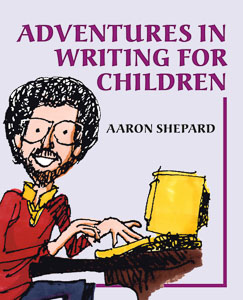The use of quality children’s literature in the classroom has been a boon to most authors, but there is one group it has seriously hurt: independent anthologists.
Why? With an increase in the demand for reprint rights, permissions fees have spiraled out of sight, and the terms of license have shrunk to as little as three years—or even one printing! Also, response times have lengthened to be often as ridiculous as those taken by editors to respond to manuscript submissions. As a result of all this, many worthwhile projects are now infeasible.
Some years ago, I had the pleasure and torment of producing a collection of reader’s theater scripts called Stories on Stage (published by H. W. Wilson in 1993, and now in a second edition from Skyhook Press). Picture books, short stories, and novel extracts by contemporary authors were adapted into script form for use in middle-grade and junior-high classrooms, with the primary goal of promoting reading.
There was only one other such diverse collection of reader’s theater scripts in print, and none for that age group. I soon discovered at least one reason why. The permissions quagmire is so frustrating and demanding, there are few authors who would have both the skill to produce the scripts and the fortitude to see them through publication.
Still, I was able to learn much that would be helpful to others in similar situations. Here are a few tips.
Set a realistic permissions budget. In 1992, the fee request for a picture book, short story, novel extract, or poem could easily reach $2,000, and sometimes higher. Based on such figures, a reasonable budget would allow at least $1,000 per piece as an average, and preferably $1500.
In general, permission fees are considered your responsibility. Sometimes a publisher will grant a permissions budget, or give an advance on royalties to go toward fees—but be aware that such a budget or advance may not cover your total costs, and may not be meant to do so. Children’s anthology editing can become a form of subsidy publishing, and the benefits may be more professional than financial.
Include all essential information with your permission requests. The lack of a single item can create a delay of months. Include all of the following:
- Title of your book
- Author/editor (your name)
- Publisher
- Publication date
- Estimated page length of the book
- Total number of selections
- Binding (hardcover and/or paperback)
- Edition (trade or textbook)
- Estimated print run (number of copies)
- Estimated list price
- Identification of selection (title, author, chapter, etc.)
- Word count of the adaptation or reprint text
- Exact rights requested (reprint, North American, etc.)
- A request for a tax I.D. number—Federal I.D. or Social Security number, in the United States—for any payment to be administered by your publisher
- A copy of your adaptation or reprint text
If you are not sure of any of this information—especially the rights you need—consult your publisher. In fact, your publisher may draft a sample request for you or supply a standard one. But don’t feel shy about adding any of the above items if they’re missing.
Sample permissions letter (PDF, 1 page)
If you like, you can also offer a specific fee. This may discourage some higher fee requests, but it will also forestall lower ones. In any case, you may want to set any standard offer at a figure below the average you can pay, because some requests will surely be higher.
Follow up within a couple of months. Small projects often wind up at the bottom of big piles. Be persistent, but not obnoxious. Follow up by mail, or preferably by phone. If by mail, include a copy of your original request. If by phone, give the date of that request. Make careful notes of who you talk to and what is said.
Negotiate the terms. In most cases, fees are flexible, even if not as flexible as you’d like. I was able to get a number of fees lowered by one‑third to one‑half. One lovable permissions manager reduced her fees by two‑thirds when I let her know I couldn’t afford anything higher.
Take special note of the term of license, which can be five years or less. To avoid the hassle of renewal, you may sometimes find it worthwhile to negotiate a higher fee in exchange for a longer permission period.
Finally, note when the fee must be paid. If the contract specifies immediate or prompt payment after signing, this can sometimes be changed to payment on publication. This is safer, because you might wind up not using the piece—or your book itself might be postponed or canceled. (If a fee is due on publication and you don’t use the piece, you don’t have to pay.)
Jim Trelease recommends asking first for fee “estimates” or “quotes” instead of contracts. This way, you can make a final selection based on price before any payment is required.
Have more material than you need. Chances are, some permissions will fall outside your price range, even after negotiation, and others will be flatly denied. Always have enough selections so that some can come out. If you have to come up with new material and start the permissions cycle all over, your book will be drastically delayed.
Don’t take it personally. Your project may be terribly important to you, but to the harried permissions manager who receives your request, it’s just one of thousands. No matter how frustrating the process, maintain professionalism and courtesy. State your case clearly, and give the other person the opportunity to rethink and compromise. Even in the permissions quagmire, good communication skills can sometimes produce small miracles.
